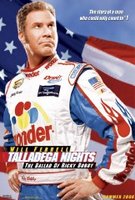 Argh - bad consistency with these daily reviews. I've been out of town for a few days, so forgive my laxness. Back on schedule now.
Argh - bad consistency with these daily reviews. I've been out of town for a few days, so forgive my laxness. Back on schedule now.Anchorman was a gleeful example of a Hollywood comedy that was not only funny, but featured a stupid and laughable character in the lead instead of a successful middle-class yuppie whose only travails are not getting laid or rich enough. Part of this aversion is taste, sure, and not all comedy must wallow in idiocy as the best British comedy does. But mainstream American comedy films have lately been so determined to be glossy and glamourous that we have ‘comedies’ starring Kate Hudson or Jennifer Lopez as characters in high-powered but sexy jobs with everything going for them delivering awkward one-liners about needing a man and not getting laid enough. Absurdity is a rare commodity in American films, and it’s great that Will Ferrell and Adam McKay are diving into it headfirst, starting with Anchorman and now with Talladega Nights: The Ballad of Ricky Bobby.
Ferrell and McKay’s concession to conventional tastes does pay a price, as it’s harder to get absurdist gags from NASCAR than it is from a pompous TV news presenter, but Talladega Nights is still a lot funnier and more adventurous than most Hollywood comedies. There are no fart jokes or smug WASP witticisms. Ferrell’s fairly dumb and ridiculously confident racing driver, who falls into the business by accident after a lifetime of chanting “I wanna go fast”, drives the film instead. The obstacles (although narrative integrity is hardly essential) are the French racing maestro Jacques Giraud (Sacha Baron Cohen, best known as Ali G and Borat), Ricky’s loss of confidence following a horrendous crash, and his best friend (John C. Reilly) stealing his golddigger wife after years of playing second fiddle to Ricky. These plotlines make Talladega more linear and unified than the wonderfully sketchy and episodic Anchorman, but the absurdity is a little reined in (except for a scene involving a cougar and the interlude where Ricky is convinced that he is paralysed, despite all evidence to the contrary).
But like Anchorman, this features a stellar supporting cast. Cohen is tremendous as the openly gay driver with the ridiculous French accent – the film really comes alive when he enters and suffers a little when he’s off screen. Gary Cole channels pure redneck power as Ricky’s deadbeat Dad, and Reilly sells Cal’s approval complex handily and has great chemistry with Ferrell despite his inexperience at slapstick comedy. There aren’t any major female characters though, which is a shame. Talladega is a bit of a boy’s own affair, although that certainly hasn’t hurt the film’s box office. It’s nice to see America embracing a comedy like this even a few months after similarly rewarding Click…
Looking back, Talladega is actually something of a rewrite of Anchorman, even as the more restrained humour and wildly different setting deflect attention while watching it. The pompous professional is upstaged by a rival, has a major comedown into a degrading new life, and then finds it in himself to succeed again. Ricky himself is even a Southern version of Ron Burgundy, minus the staggering delusion regarding his sex appeal and talent (Ricky is actually a good driver, Ron has just been lucky). But Ferrell and McKay’s films are so unabashedly fun and good-spirited that such observations are moot (the matching initials of Ferrell’s characters and the two films’ similar subtitles are probably an open acknowledgement of their matching plot and style). They embrace genuine comedy that leaves no-one looking good, and while the new film lacks the cultish absurdity of Anchorman (which probably explains its difficulty getting greenlit), Talladega is a lot of fun, although its willing diplomacy towards the mainstream do hamstring some of the comedy’s full potential.
No comments:
Post a Comment